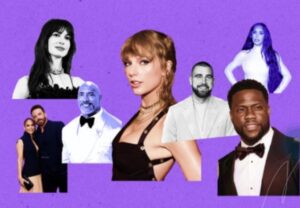CELEBRITY
Haters gonna Hate: Why these Celebrities can’t stand Travis Kelce and Taylor Swift hot and steamy Relationship.K

Unless you’ve been living under a rock for the last six months, you’re probably aware of superstar Taylor Swift and talented football player Travis Kelce’s rom-com storyline relationship.

And if you’re a football fan, you’ve probably also gotten used to seeing her face on television — not via her typical realm of award shows or in her new Eras Tour movie … but at Chiefs games.
The NFL’s tendency to show clips of Swift attending the games has sparked some controversy in both the sports world and pop culture, with many “dads, Brads and Chads” expressing disdain for her presence, from claiming games are rigged to stating she is ruining football. It’s time to stop hating on Swift for attending Chiefs games, but not for the reason you might think.
Now, I’m aware that I’m probably not the first person to make this claim, and I’m sure you’ve heard the supporting evidence that the animosity toward her presence boils down to blatant sexism. I’m not going to ignore that argument whatsoever, because it is undeniably true in some cases. However, there’s an even more important reason why the internet needs to stop banning together and hating on Swift: We need to practice tolerance for the things we dislike.
Yeah, that’s right. An avid, proud and borderline annoying Swiftie is telling you that I find it OK for you to dislike Swift (although it produces many implications). However, you can despise Swift and her attendance at the games while simultaneously keeping your mouth shut. Why is that seemingly so impossible? People lack this ability because, as a society, especially with the growth of social media, we have lost the key to unlocking tolerance.
The New York Times reported that in an average three-hour football broadcast, Swift is shown for approximately 30 seconds. I find it fascinating that 30 seconds can trigger so much online hate, and it demonstrates how society has lost touch with benevolence — or even, at the very least, pure ambivalence.
This phenomenon poses a variety of questions. If an individual can’t even handle seeing clips of a celebrity they dislike for less than a minute without taking their anger online, how can they handle working alongside an annoying coworker or tolerating the presence of a disgruntled in-law? It takes a lot of energy to perpetuate and sustain the cycle of seeing Swift on TV, becoming so annoyed that you turn angry and choosing to express those grievances on various social media platforms. It takes no energy to remain hateful and quiet. Yet, so many people choose to ignore the latter option. Why?











